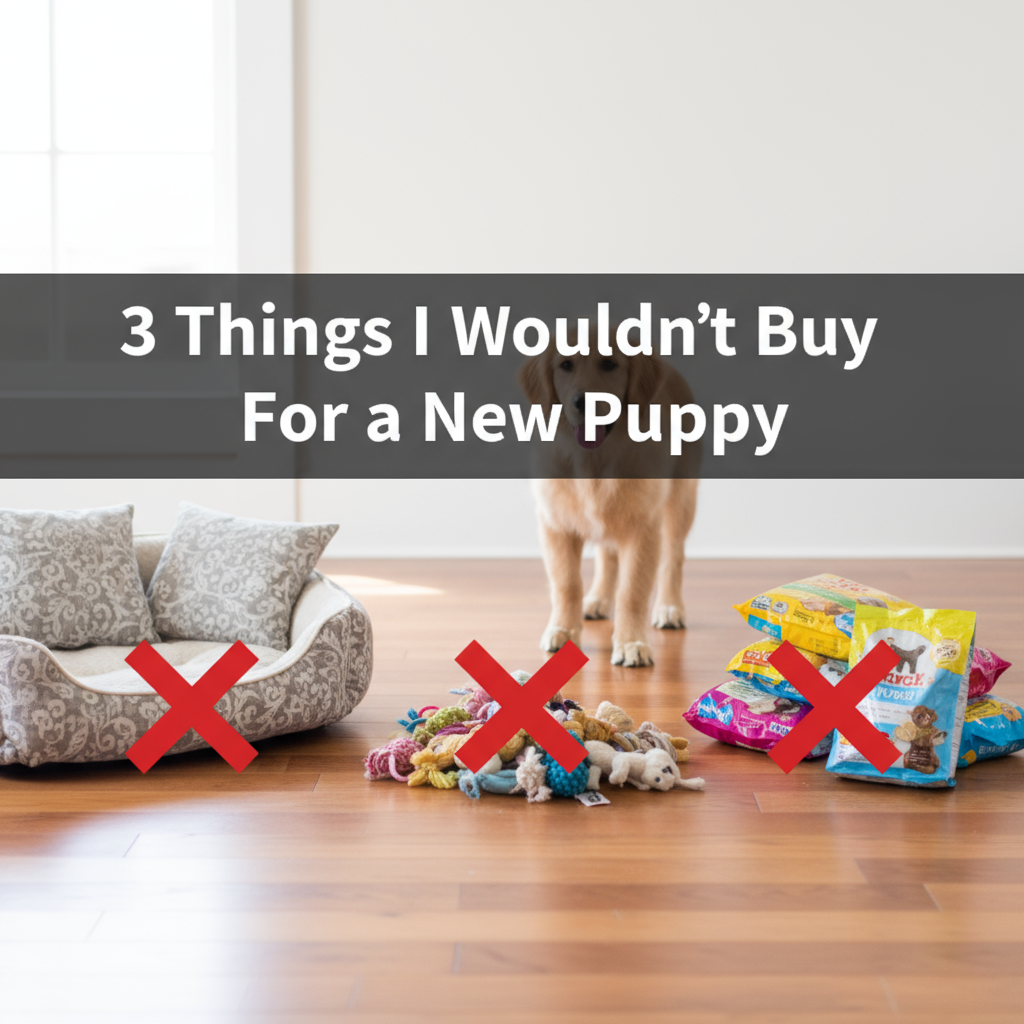3 Things I Wouldn’t Buy For a New Puppy
Estimated Reading Time: 5 minutes
- Investing in fancy collars can lead to waste, as puppies quickly outgrow them.
- Puppies tend to destroy expensive beds, posing a safety risk if they ingest materials.
- Pee pads can complicate potty training instead of simplifying it.
Table of Contents
- 1. Fancy or Expensive Collars
- 2. Puppy Beds (Fancy or Otherwise)
- 3. Pee Pads
- Additional Items to Avoid (Bonus Insights)
- Conclusion
1. Fancy or Expensive Collars
Why Not to Buy
One of the most common mistakes new puppy owners make is investing in fancy or expensive collars. Puppies grow at an astonishing rate, particularly in their first several months. That chic collar you splurge on may not fit in only a few weeks as larger breeds can outgrow collars in a matter of days, rendering them impractical and a waste of hard-earned money (source: Puppy Leaks).
Expert Advice
Instead of opting for the most stylish option, consider selecting a simple, adjustable collar. This type of collar can accommodate your puppy’s rapid growth and is easily replaced as your pup matures. Once your dog reaches their final size, you can think about investing in a high-quality collar without the risk of it becoming outdated too soon (source: TPW Pet Hotel).
2. Puppy Beds (Fancy or Otherwise)
Why Not to Buy
Puppies are prone to chewing, and many find even the most durable dogs’ beds irresistible targets. Investing in expensive or specialized beds can lead to frustration and financial loss, as most puppies will likely destroy them in a relatively short timeframe. Beyond financial concerns, there’s a potential hazard: if puppies ingest foam, stuffing, or zippers from a chewed-up bed, it could require an emergency visit to the veterinarian (source: TPW Pet Hotel – source: Dog Gear Review).
Expert Alternatives
Consider using old towels, blankets, or washable crate mats instead. These items are not only inexpensive, but they can serve their purpose in providing a cozy resting spot for your new furry friend. If you do decide to purchase a bed, look for options with minimal filling and avoid leaving it unattended with your puppy until they’re out of the destructive chewing stage. This will help you sidestep unnecessary expenses and keep your pet safe.
3. Pee Pads
Why Not to Buy
Pee pads might seem like a convenient solution for managing indoor accidents; however, they can actually complicate or prolong potty training. By teaching your puppy to eliminate on absorbent surfaces, pads can create confusion when transitioning to outdoor relief. Many puppies may end up having “accidents” on rugs, blankets, or mats that are similar in texture to the pads, making the transition more challenging (source: Puppy Leaks).
Expert Advice
Instead of relying on pee pads, adopt a strategy that focuses on consistent, supervised outdoor potty breaks right from the start. By doing so, most puppies can be reliably housebroken quickly, eliminating the need for pads altogether (source: Puppy Leaks).
Additional Items to Avoid (Bonus Insights)
While we’ve discussed the top three items to skip, here are a few more that may lead you astray during your puppy shopping spree:
- Super Cheap Treats: It’s tempting to buy low-cost treats, but these often contain unhealthy fillers and additives that can upset your puppy’s stomach. Investing in quality treats for training and rewards is a safer bet (source: TPW Pet Hotel).
- Excessive Training Tools: Hold off on buying specialty training gear until you’ve had a chance to understand your puppy’s temperament and needs. A professional trainer can provide assistance in selecting the right tools when the time comes (source: TPW Pet Hotel).
- Branded Clothing: While a light coat for colder weather is acceptable, resist the urge to overbuy clothing—puppies grow quickly, and most attire may not fit next season (source: TPW Pet Hotel).
Conclusion
The excitement of bringing home a new puppy might lead you to over-shop, but practicality and restraint are keys to ensuring a smoother transition for both you and your new furry family member. By avoiding unnecessary purchases like expensive collars, fancy beds, and pee pads, you can not only save money but also reduce potential health risks and training setbacks. Prioritize essential items, closely monitor your puppy’s growth and behavior, and you’ll set the stage for a fulfilling journey in puppy parenthood. It’s all about making informed decisions and focusing on what truly benefits you and your puppy in the long run (source: TPW Pet Hotel – source: Puppy Leaks – source: Dog Gear Review).
For more pet care tips and guides, visit Pet Blog.
